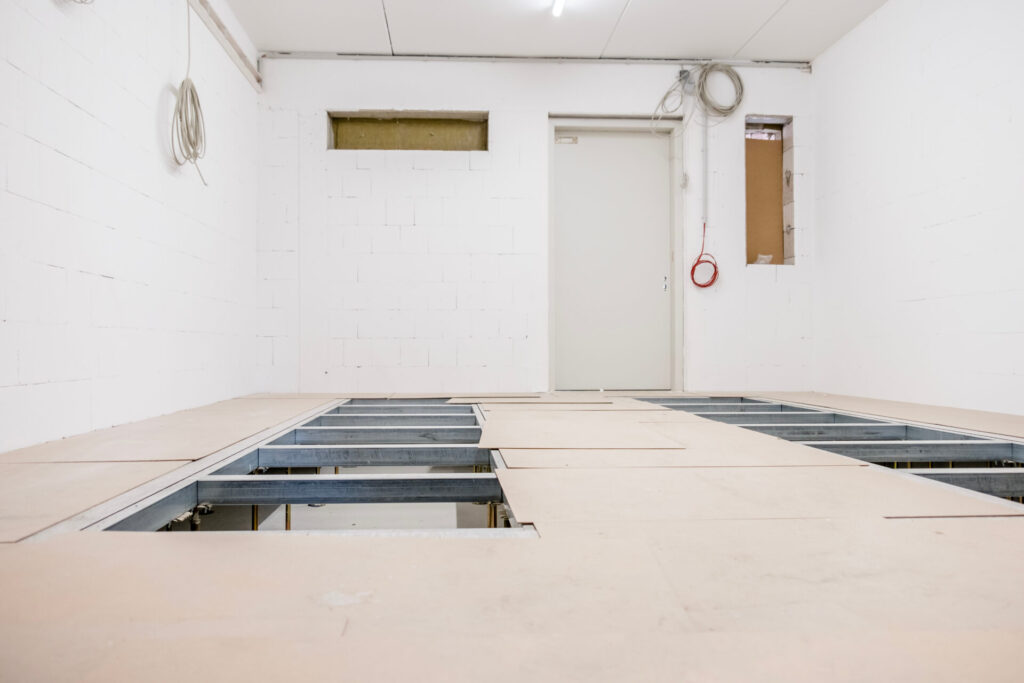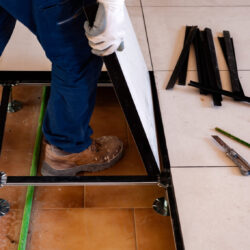Your data or communications center’s raised access flooring is a lifesaver. It makes maintaining your electrical, data, and HVAC infrastructure infinitely easier. It improves airflow around and through your valuable equipment. It makes installing new equipment a much simpler and faster process.
Unfortunately, it also has an expiration date.
Raised access flooring systems are built to be as durable as possible, but none are permanent solutions. Inevitably, the expected wear and tear on your floor accumulates over time, eventually turning what was a convenience into a hazard for your equipment and, more importantly, your employees.
Here are some signs that may indicate your raised access flooring needs replacement and some ways you can prolong the life of your access floor system.
Your Raised Access Floor Tiles Are Warped and Lipping
The tiles in an access floor system are only supported on their edges. As strong as they are, they will eventually warp over time. The tiles that carry the most traffic – particularly those that regularly carry heavy rolling loads – will start to show signs of warping and sagging in the center.
The effect of this warpage is called “lipping” – as the tile sags in the center, the edges raise slightly, creating a “lip” as the edge of one tile sits higher than the edge of the adjacent tile. This lip doesn’t just make the floor uneven; it causes the affected tile to rock in place as weight moves across it.
This lipping is more than an inconvenience; it’s dangerous. Warped floor panels:
- Present a trip hazard for employees
- Impede workers’ ability to roll equipment carts and dollies smoothly into position
- Open the door to further warping, which can eventually lead to panel failure
How to Reduce Warping and Lipping
There’s no way to eliminate the warping of your raised access flooring tiles completely, but you can take some steps to reduce the effects and prolong your floor’s life:
- Regularly rotate tiles, swapping panels between high-traffic and low-traffic areas to even out the wear.
- If your system features reversible tiles, flip them over regularly. Alternating the load from one side of the tile to the other can significantly reduce the effects of warping.
- Ensure that all employees in your facility understand and abide by your particular floor system’s load limits.

Your Raised Access Flooring Is Out of Level
You’re working with cart-mounted equipment on your raised access flooring when you suddenly realize that your expensive gear is slowly starting to move. It’s not an anomaly; it’s an access floor that’s gotten out of level.
Beneath your raised access flooring is the floor’s support subsystem, which comprises the gridwork of stringers into which your floor panels fit and the pedestals that support the whole system. While well-engineered and remarkably strong, the pedestals are the usual cause for floors getting out of level. There are two leading causes for this:
Pedestal Head Adjustment
Every pedestal in your access floor has an adjustable head that can be raised or lowered. These heads are all leveled to one another when an access floor is first installed. But as technicians, workers, and others remove tiles, install equipment, or move cabinets and racks, they’ll make minor adjustments to your pedestal heads. As these adjustments accumulate, your floor becomes out of level.
Pedestal Deflection
As loads move across the floor, the weight being carried by each pedestal moves and imperceptibly flexes the pedestal a tiny amount to one side or another. Again, these tiny flexes add up over time, and pedestals eventually deflect or shift noticeably to one side. This deflection:
- Artificially lowers the height of the pedestal, leading to a low spot in the floor
- Makes further deflection more likely, which can lead to the complete failure or collapse of the pedestal
How to Keep Your Floor Level
Just as with tile warpage, eliminating a floor’s tendency to go out of level is impossible, but it can be reduced:
- Again, take steps to ensure that your floor system’s load limits are strictly observed
- Ensure that all employees and outside vendors working under the floor are well-trained on the importance of keeping pedestal heads level to reduce the impact of adjustments.
- Schedule an annual floor inspection with a qualified technician to identify and correct pedestal deflection before it becomes a problem.
Your Raised Access Flooring Is 20+ Years Old
Most raised access floors are designed to last about 25 years. We recommend you consider replacement before that deadline, usually when the floor is around 20 years old. For one thing, that gives you some cushion and allows you ample time to identify a replacement system, find a contractor, and get the work done. For another, the closer a floor gets to its design life, the more likely it is to begin experiencing severe failures.
When It’s Time to Replace Your Raised Access Flooring
Last month, we discussed some questions for your raised access flooring contractor. If your floor is nearing end-of-life, or if you’re seeing symptoms of the above issues becoming a problem for your operation, it’s time to ask those questions.
One primary consideration when it comes to replacing a raised access floor is that of downtime. Traditionally, replacing an access floor has required significant downtime and major inconvenience. Racks and cabinets must be moved out of the way to allow for structural replacement, components have to be disconnected and powered down, and cabling and ductwork must be rerouted to reach the temporarily dislocated equipment. Then it all has to happen again, in reverse, when the new floor is installed.
At Jerry L. Johnson and Associates, we’ve overcome the downtime hassles of access floor replacement. Our proprietary process lets us lift your equipment off the floor while it’s still connected, replacing your entire access floor system without any costly downtime!
Need a New or Replacement Access Floor? JLJ & Associates Can Replace Your Floor Without Downtime!
JLJ and Associates is Georgia’s choice for access flooring. Our proprietary technology can replace your access floor while your equipment remains online! Call us today to find out how we can develop a solution that works for you! 770-961-7600
Related Articles:

